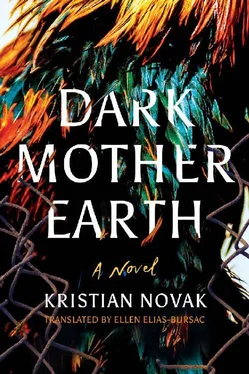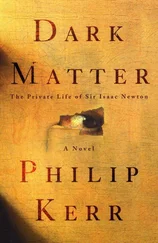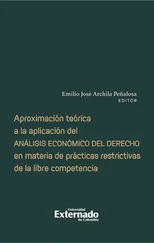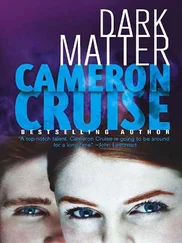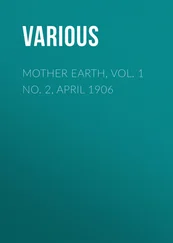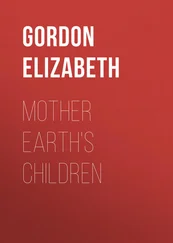“I’ll take a spritzer, Janja.”
“And I’ll take whatever you have on tap… Janja. So how’ve you been, Pajdo? I haven’t seen you… must be a year,” said Matija.
“They sent us packing. While we were collecting debris, someone stole the iron manhole covers, the ones on the street, and then one of your neighbors had an accident when he drove over the uncovered manhole. But it wasn’t us.”
“I’m sure.”
“Now we just scavenge for copper, tin, that sort of thing. Maybe old paper, too. If you have any…”
“Not me, but at my work. We have tons of old paper. Usually we put it out for the recycling truck, but I could arrange for you to pick up a load. Come on Monday, noon, Maksimirska Road across from the outdoor market. I’ll tell the porter.”
“Boss, you’re good to me. Now it’s my turn. Janja!”
“No, no, I still have some.”
“All right, later then. What do you do?”
“I work for a government agency. Boring, really. But I used to have a nice hobby, I wrote. Novels and short stories.”
“Not anymore?”
“No, today I’m quitting. I worked on a book for two years, and no one can stand it. So that’s it, I capitulate. A year too late. I should’ve been doing something else,” Matija said, then took a big gulp.
“No, boss, that’s not capitulation,” said Pajdo, shaking his head. “To give up on your dreams, that’s not for just anyone.” Matija looked him in the eyes for the first time. “For that, you need gumption.” Pajdo assumed the voice of a well-meaning auntie reading fairy tales to children. “I’ll tell you how it goes. I am an expert in this. First you only think about things you don’t like, about what you want and can’t have. Just the bad side. You seal yourself off in your cave, stop talking to people. That takes time—six months, maybe years, depending on the person. You see, when you’re a kid, you divide everything into good and bad. Good things seem beautiful and strong, they smell nice, and you want them. You feel like you already have them. Then you’re older, and you see you’ve somehow become all the things you thought of as bad, weak. They’re there, and you can’t get rid of them.”
“Mrs. Janja, pour us another. Whatever’s on tap.”
Pajdo kept talking in this hypnotic tone, and Matija drank his beer. One by one, everything around him slipped away. The bar, the older drunks, then the younger ones, the ashtrays, and the bad attempts at portraits of generic English lords on the walls. After a while, Matija could no longer feel his face, and he began thinking that he, too, was slowly vanishing. Only Pajdo and his voice, and the silent old man in the socks, were left. Objectively, maybe his companions weren’t real. Was he actually talking to Pajdo? Who cared, this wouldn’t be the first time he’d invented someone to talk to.
While part of his brain was trying to place the face in front of him, another was reconstructing the dream the face had plucked him from. It was about a town of strange people on a hill covered with dark-green conifers. The hill was actually an island, because when night fell the water rose and turned into this immense lake, and no one could get on or off. First the dogs started dying, then the chickens and cows, and then, in terrible agony, the people. By dawn only Matija was left, waiting for the water to ebb.
When he woke, he was on a sofa in his sister’s place, and it was late afternoon. His sister’s husband was facing the stove, putting water on to boil as quietly as possible.
“Well, where have you been, Mr. Life-of-the-Party? Why drink when it causes you pain?”
Matija couldn’t force cheeriness. He was wearing a T-shirt bearing the logo of the bank where his sister’s husband worked, and pajama bottoms.
“What time is it?”
“Late for some of us. We called in sick for you. Don’t forget to mention your one-day flu and very high temperature. Drinking on a school night, eh?”
“Wait till you hear where I got plastered. Lord. You know, that dive by the post office?”
“Geez, hear that?” his sister’s husband chuckled, leaning on the stove.
His sister laughed. “I’ve never thought of you as a Lord type. What, you got drunk with the desperadoes? I’m not going to hook you up with the doctors at Vinogradska, the hospital for alkies!”
Matija grinned weakly.
“Listen, please don’t tell Mom. You know what she’s like.”
“Okay, sure.”
“Don’t give me that ‘Okay, sure’ stuff. You know she’s afraid I’ll crack up…”
“Well, okay… But look, was there a particular reason?”
“As if I need a reason. But if you want, I’ll dig one up…”
His sister gave her husband a few instructions about shopping and the importance of timing for getting the food in the oven, and he headed out. She poured two cups of coffee.
“So, now, what happened? For real this time.”
“Gita read the manuscript. She says it’s crap.”
“Oh, come on… You didn’t get drunk with her, did you? I’ve told her to stop that shit, but you can’t teach an old goat new tricks…”
“Don’t worry, she wasn’t there. Gita has things under control. I was with her yesterday when she went to pick up her sleeping pills.”
“Oh, okay. Well, so she didn’t like the story about the Roma guy and the ugly girl? Well, I guess that’s a good reason to get plastered. I haven’t had time to read it yet, but I have it on the computer…”
“Forget it, delete it. It’s not worth the time.”
“Hey, don’t start with the pity party now… Relax a little, hang out with friends, watch a couple of mindless movies in that new 3-D theater, take a trip somewhere. Forget yourself for a while.”
“That’s been the problem.”
“What?”
“Nothing.”
“Listen. You have two books behind you, and now you’re reassessing things. I mean, I don’t know much about writing, but I know you’ll snap out of this. Best to let sleeping dogs lie, like Granny would have said.”
“But I can’t remember.”
“There are first-rate writers who hadn’t even started at your age. And ones who only wrote crap for years. Fuck. It’s a waiting game.”
“I’m not one for patience. I’m just a smidge overbearing.”
“Then, brother dear, it’s time for you to focus on other things. I understand you like it, but you can’t live off writing, so it’s a hobby, right?”
“Yeah, just like collecting baseball cards or sticking pins in a world map.”
“Oh, come on, don’t start with some story about writers as precious jewels or whatever. I’ll lose it. Have you ever wondered why you need this anyway? Are you happy? I don’t think so.”
“No, but I can tolerate myself when I write. It’s only then I can see things clearly.”
“How sad.” His sister barked a laugh, clearly angry. “You’re just a pathetic version of yourself. Now, I’ll tell you something. I got test results for a kid who’s twenty-seven, younger than you. A brilliant chemist, came out of nowhere, central Bosnia, he doesn’t even know where his parents were killed in the war, works at the Ruđer Bošković Institute and volunteers, in his spare time, to tutor kids from poor families. And he came in this morning with a headache, turns out it’s a brain tumor, inoperable, and he’s got three months to live. Over the coming weeks, he’ll lose function after function as he slowly fades. On Monday he’s coming back, and I’ll have to break the news. And now I’m listening to you whining about your lost-cause writing. Who cares?”
“Hey, why ask if you don’t want to hear about it?”
“…”
“Look, I feel sorry for the guy. What’s his name?”
Читать дальше
